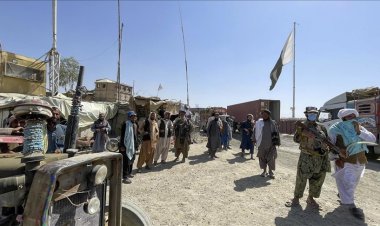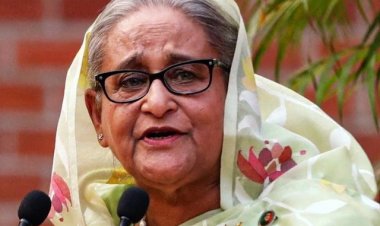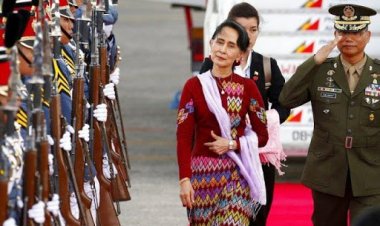U.S. Troop Withdrawal from Afghanistan: Boon or Bane for Beijing?
Although the political future of Afghanistan remains uncertain, it is clear that the troop withdrawal will leave long-lasting geopolitical imprints as several nations with competing interests will rush to fill the vacuum Washington leaves behind. Beijing is at the forefront, proactively expanding its role and influence in the region.

Analysis
By Rushali Saha
Washington is well on track to meet its 9/11 deadline to withdraw all American troops from Afghanistan—with the latest estimates suggesting that 30 to 44 percent of the entire retrograde process already being completed. This undoubtedly is a watershed moment in history as it marks the end of a two-decade-long war on terror. Although the political future of Afghanistan remains uncertain, it is clear that the troop withdrawal will leave long-lasting geopolitical imprints as several nations with competing interests will rush to fill the vacuum Washington leaves behind. Beijing is at the forefront, proactively expanding its role and influence in the region. Earlier this month, China virtually hosted the fourth China-Afghanistan-Pakistan Trilateral Foreign Ministers Dialogue where the parties reaffirmed their “commitment to strengthening political mutual trust, enhancing exchanges and communication and forging closer good neighbourly relations and partnership.”
Chinese interests in Afghanistan
Stability in Afghanistan is fundamental to China’s national security framework in Xinjiang. Beijing’s biggest fear would be the “spillover” of international terrorist organizations into its borders. Reports suggest that Uyghur separatists have deep links with Al Qaeda, even receiving training from them in Afghan territory.
Afghanistan has been accorded a central place in China’s BRI project, with the Chinese government discussing Afghanistan’s incorporation into the China-Pakistan Economic Corridor (CPEC) for a long time now. Beijing has changed its earlier policy of staying on the sidelines of any discussion around Afghanistan and now sees itself as a vital, constructive player in the Afghan peace process. Beijing has been actively encouraging powerful Chinese companies to invest in Afghanistan for a while now and currently China is Afghanistan’s largest business investor. Major Chinese firms have won some large extractive projects and construction firms like Xinjiang Beixin, CBRC have worked on major infrastructure projects as well. In 2016, the Chief Executive of Afghanistan, Abdullah Abdullah, and his Chinese counterpart signed an MoU to boost cooperation under the BRI. Under the umbrella of BRI, an air corridor linking Kabul and the Chinese city of Urumqi was launched in 2017, the same year when Afghanistan gained permanent membership into the Asian Infrastructure Investment Bank (AIIB)—which funds BRI projects.
As the world’s largest energy consumer, China is estimated to account for roughly 22% of world energy consumption in 2040. The United States Geological Survey (USGS), through its extensive scientific research of minerals, concluded that Afghanistan may hold 60 million metric tons of copper, 2.2 billion tons of iron ore, 1.4 million tons of rare earth elements (REEs) such as lanthanum, cerium, neodymium, and veins of aluminum, gold, silver, zinc, mercury, and lithium—naturally attracting Chinese attention, which is hungry for resources. China acquired the exclusive right to extract copper from the Mes Aynak mine in the Logar province for $3.4 billion in 2007. Several Chinese energy companies have invested enormously in foreign oil and gas resources, often with assistance from the government, securing large tranches of supply that could last it for decades. A group of Chinese firms has already announced their plans to invest $400 million into a coal-fired electricity generation project in Afghanistan, during a meeting with Afghan President Ashraf Ghani in May 2021.
Over the past decade, China has been steadily expanding its military footprint in the region as well. Between 2016-2017, Beijing has provided more than $70 million in military aid to the Afghan government. A report published by a Washington-based newspaper suggests that since 2016, Chinese troops have been quietly posted at an outpost near Tajikistan’s borders with Afghanistan, just beyond China’s western frontier. Prominent Indian defense analyst Col, Vinayak Bhat (retd) writing for an Indian newspaper—using open-source satellite imagery—confirmed the operation of a Chinese base at Kyzylrabot in Tajikistan, approximately 12 km from the strategic Wakhan corridor and 30 km from the Chinese border. Although Beijing has denied the presence of PLA troops in the country, it has accepted carrying out training activities like ‘joint-counter-terrorism operations’ with Kabul. The Afghan embassy in Beijing confirmed that China is helping Afghanistan set up a mountain brigade in the country’s north to boost counter-terrorism efforts, but denied the presence of ‘Chinese military personnel on Afghan soil.’ However, a spokesperson from the Defence Ministry of Afghanistan confirmed that the plan to build a Chinese military base has been in discussion since 2018 but the final details have not been established. He also clarified that Afghanistan would build a military base, provided the Chinese government, “extends financial help, equipment, and training for the Afghani soldiers
U.S. troop withdrawal: Implications for China
For the longest time, China’s economic interests in Afghanistan were overshadowed by security concerns, due to which throughout the 1990s and even early 2000s, engagement between the two countries was limited. Chinese activism in the country coincided with the Afghan peace process and Beijing is acutely aware of the potential resurgence of violence in the country, which would disrupt its existing economic investments and infrastructure. This in turn shapes China’s conflicting narratives surrounding the Afghan peace process. Although Beijing has historically held America’s war against terror in Afghanistan as an “invasion”; it also believes that the U.S. brokered agreement and troop withdrawal will lead to instability. It is in China’s best interests to have an internally stable Afghanistan, but with U.S. troop withdrawal it will have to enhance its development aid, military assistance to the country and engage with all stakeholders in its regional stabilization efforts.
Beijing is acutely aware of the challenges of a negotiated settlement internally between the Afghans and the Taliban. China has even offered to host peace talks between the Afghan government and the Taliban while officially endorsing Ghani’s political victory. There is a persistent fear among the Chinese that U.S. troop withdrawal may disrupt the delicate power equilibrium in Afghanistan between the government and the Taliban and lead to a vicious cycle of violence and instability. China is especially concerned about violence and instability in the Afghanistan-Pakistan belt, which has been a terrorism nucleus, which could disrupt the progress of CPEC. China is trying to win Taliban cooperation, reportedly by offering to build roads in Taliban-controlled territories, as well as several energy projects, including generating electricity. However, to China’s dismay, several analysts predict that the Taliban will brush off Chinese inducements and “make a bid to take complete control of the country.”
China’s future policy in Afghanistan
China’s main priority will be to ensure domestic stability in Afghanistan, even if that would involve Chinese intervention. This can take the shape of sending peacekeepers to Afghanistan, an idea that Beijing’s strategic community is already toying with. It is more likely that China will intensify its security presence along the border under the rhetoric of counter-terrorism operations. Beijing is likely to advance trilateral cooperation with Pakistan in Afghanistan through the China-Afghanistan-Pakistan foreign minister/vice-minister dialogue mechanism which has been ongoing since 2017. Although Beijing has committed to take “China-Afghanistan relations to the next level for the benefit of the entire region” it is likely to continue its cautious approach and refuse to take a clear leadership role in Kabul.
Rushali Saha is a Research Associate and Editor in Chief at Usanas Foundation. She is also currently working as a Research Associate at the Centre for Air Power studies.























